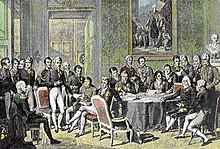Gustav Ernst von Stackelberg
Gustav Ernst Graf von Stackelberg ( Russian Густав Оттонович Стакельберг ; born June 5, 1766 in Reval ; † April 6, 1850 in Paris ) was a German-Baltic nobleman and imperial Russian diplomat.
Life
Origin and family
He came from the German Baltic noble family von Stackelberg . His father was the diplomat Otto Magnus Graf von Stackelberg , who was also in Russian service . His mother was Sophia Gerdruta (born von Völckersahm). He himself married Karoline Countess von Ludolf in 1805. With this he had several offspring, including:
- Otto Magnus von Stackelberg (1808–1885)
- Gustav von Stackelberg (1810–1847)
- Ernst Johann von Stackelberg (1813–1870)
- Alexander von Stackelberg (1814-1856)
Career
Gustav Ernst studied law in Strasbourg from 1782 and then completed a cavalier tour through Germany , France and Italy . In 1786 he joined the Imperial Russian Guard on Horseback as a cornet . In 1788/89 he took part in the war against Sweden as a lieutenant . He then received the court title of chamberlain and entered the Russian diplomatic service. He was first an attaché in Warsaw and then in Stockholm . In 1794 Stackelberg was appointed the real Chamberlain and Privy Councilor.
Between 1794 and 1797 von Stackelberg was envoy in Turin . From 1799 to 1802 he was officially authorized minister in the Helvetic Republic . He could not take up the post because of the Second Coalition War against France. After that he was envoy to the Batavian Republic from 1802 to 1805 and, after the establishment of the Kingdom of Holland in 1806/07, he was with King Louis Bonaparte in The Hague .
He was then from 1807 to 1810 envoy at the Prussian court in Königsberg . During this time he was awarded the Alexander Nevsky Order and the Order of the Black Eagle . In addition, in 1808 he was appointed a real secret council.

Between 1810 and 1812 and again from 1813 to 1818 he was envoy in Vienna. As such, he took part in the Congress of Vienna in 1814/1815 . He was a member of the ranking committee there. He is shown seated in the famous painting by Jean-Baptiste Isabey . After Napoleon's return in 1815, he and the representatives of the powers signed the declaration against Napoleon for Russia alongside Karl Robert von Nesselrode . Alongside Andrei Kirillowitsch Rasumowski , he signed the final act for his country on June 9, 1815. A day later he received from Emperor Franz I. the ku St. Stephen's Order .
He also received the Order of St. Vladimir in 1815 and he was awarded the Luttringen Crown Estate for twelve years. Between 1818 and 1820 and again from 1822 to 1835 he was envoy to Naples . In between he was ambassador to London in 1821/22 . In 1834 he received the Order of Saint Andrew the First Called . In 1835, after leaving the diplomatic service, he lived in Paris, where he became one of the protectors of Marie Duplessis (the lady of the camellias).
He died in Paris in 1850, his grave is in the Montmartre cemetery .
Web links
- Baltic Historical Commission (ed.): Entry on Gustav Ernst von Stackelberg. In: BBLD - Baltic Biographical Lexicon digital
- Entry in: Erik Amburger database of the Institute for East and Southeast European Studies ( online )
Individual evidence
- ^ A b c d e Erik Amburger : "The permanent diplomatic representatives abroad". History of the Russian authorities organization: from Peter the Great until 1917 , EJ Brill, Leiden 1966, p. 440 ff.
- ^ Thierry Lentz : 1815. The Congress of Vienna and the re-establishment of Europe. Munich, 2014 p. 143
- ^ Thierry Lentz: 1815. The Congress of Vienna and the re-establishment of Europe. Munich, 2014 p. 156
- ^ Thierry Lentz: 1815. The Congress of Vienna and the re-establishment of Europe. Munich, 2014 p. 288
- ^ Thierry Lentz: 1815. The Congress of Vienna and the re-establishment of Europe. Munich, 2014 p. 340f
| predecessor | Office | successor |
|---|---|---|
| Alexander Mikhailovich Beloselsky |
Russian envoy to Sardinia-Piedmont 1794–1798 |
Adam Jerzy Czartoryski |
|
Russian envoy to Switzerland 1799–1802 |
Ioannis Kapodistrias | |
| Stephan Alexeijwitsch Kolykow |
Russian envoy to the Netherlands 1802–1807 |
Sergei Nikolayevich Dolgorukov |
| Maximilian of Alopaeus |
Russian envoy to Prussia 1807–1810 |
Peter of Oubril |
| Andrei Kirillowitsch Rasumowski (until 1806) |
Russian ambassador to Austria 1810-1818 |
Yuri Alexandrovich Golovkin |
| personal data | |
|---|---|
| SURNAME | Stackelberg, Gustav von |
| BRIEF DESCRIPTION | German-Baltic nobleman and imperial-Russian diplomat |
| DATE OF BIRTH | June 5, 1766 |
| PLACE OF BIRTH | Reval |
| DATE OF DEATH | April 6, 1850 |
| Place of death | Paris |
